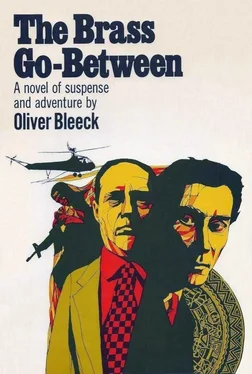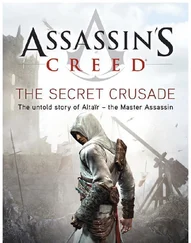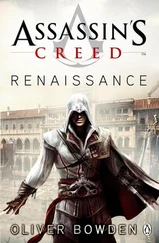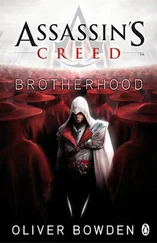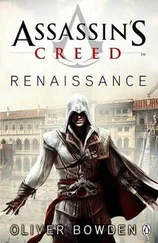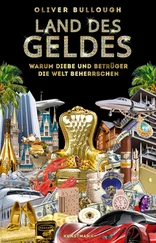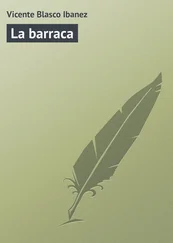Oliver Bleeck - Brass Go-Between
Здесь есть возможность читать онлайн «Oliver Bleeck - Brass Go-Between» весь текст электронной книги совершенно бесплатно (целиком полную версию без сокращений). В некоторых случаях можно слушать аудио, скачать через торрент в формате fb2 и присутствует краткое содержание. Город: New York, Год выпуска: 1969, Издательство: William Morrow, Жанр: Детектив, на английском языке. Описание произведения, (предисловие) а так же отзывы посетителей доступны на портале библиотеки ЛибКат.
- Название:Brass Go-Between
- Автор:
- Издательство:William Morrow
- Жанр:
- Год:1969
- Город:New York
- ISBN:нет данных
- Рейтинг книги:3 / 5. Голосов: 1
-
Избранное:Добавить в избранное
- Отзывы:
-
Ваша оценка:
- 60
- 1
- 2
- 3
- 4
- 5
Brass Go-Between: краткое содержание, описание и аннотация
Предлагаем к чтению аннотацию, описание, краткое содержание или предисловие (зависит от того, что написал сам автор книги «Brass Go-Between»). Если вы не нашли необходимую информацию о книге — напишите в комментариях, мы постараемся отыскать её.
Brass Go-Between — читать онлайн бесплатно полную книгу (весь текст) целиком
Ниже представлен текст книги, разбитый по страницам. Система сохранения места последней прочитанной страницы, позволяет с удобством читать онлайн бесплатно книгу «Brass Go-Between», без необходимости каждый раз заново искать на чём Вы остановились. Поставьте закладку, и сможете в любой момент перейти на страницу, на которой закончили чтение.
Интервал:
Закладка:
“It was the only cause around.”
“Still, I find many parallels between the Confederacy and my own country. Both the South and Komporeen, if my history serves me right, could be described as underdeveloped, largely agricultural, but possessed of a fierce regional pride. And jealous of tradition, too, I suppose.”
“And gracious living,” I said. “A good, unreconstructed Southerner can go on for hours about gracious living. You know, crinoline and fatback. Myths die hard in the South and from what you’ve told me, they die even harder in Komporeen.”
“Yes, I suppose you could call the aura that surrounds the shield a myth. But when you have very little else, myths become important, even vital.”
“When were you at Sandhurst?” I said.
“From ’fifty-five to ’fifty-nine. I think I may have neglected to mention it, but I’m a lieutenant colonel in our army.”
“You neglected to mention it,” I said. “How many generals do you have?”
“None. There is only Colonel Aloko who is now head of state and three other lieutenant colonels.”
“What are you, head of G-2?”
Mbwato looked surprised. “Yes, as a matter of fact, I am. However could you tell?”
I sighed and swung the Ford over into the far right lane and headed up the curving exit that leads to Interstate 66. “I just guessed,” I said.
“Mr. Ulado is my second in command. It’s Captain Ulado really.”
“The getaway expert,” I said. “I hope he’s better at that than he is at torture.”
“Oh, he is,” Mbwato said quickly, as if I’d just lodged a complaint that could turn into a hanging offense or, at least, a general court-martial. “He’s really quite efficient.”
We didn’t say much after that as we rolled through northern Virginia, through the heart of the hunt country. Highway 29 and 211 was just another road, sometimes two lanes, sometimes four lanes, and lined by the usual Stuckey candy stands, billboards, gas stations, motels, and quiet, closed-mouthed houses stuck off by themselves as if their owners didn’t mind living by the side of the road, but to hell with that friend-to-man nonsense.
At a sign that read WARRENTON, 5 MILES, I turned right and Mbwato said, “This person whom we’re to see. Does he have a name?”
“Yes.”
“Can you reveal it?”
“Yes. Winfield Spencer.”
“Ah, I see.”
“Do you?”
“Well, not really. But Mr. Spencer, I believe, is chairman of the Coulter Museum’s executive committee and I seem to recall that one of his firms was interested in securing drilling rights in Komporeen. Am I right?”
“You are.”
“Fascinating. Mr. Spencer has the shield?”
“Yes.”
“And he is simply going to hand it over to you?”
“Uh-huh.”
“Really fascinating,” Mbwato said. “Someday you will have to tell me the full story.”
“Someday,” I said. “I will.”
The road that we turned left on was a narrow, winding strip of asphalt that dipped and twisted between parallel rows of split-rail fences. There were a few unpretentious farmhouses and then the split-rail fences ended and were replaced on the left-hand side of the road by an eight-foot chain-wire fence that was topped by three wicked-looking strands of barbed wire. Behind the fence were pasture land and woods. No crops grew and I assumed that the Federal government paid Spencer not to grow anything. The chain-wire fence went on for two miles — which is a lot of fence to anyone but the military. At the two-mile point there was a stone hut with a thick, shake-shingled roof whose age was belied by the gray butt of an air conditioner which stuck out of one window. The road ended in a turnaround circle for the benefit of the strayed motorist out for a Sunday drive or for those who came calling on Spencer without an invitation. I stopped the car before the gate and the two men in gray uniforms came out of the hut and walked slowly over to the Ford. One of them, about thirty-five with gray, suspicious eyes that squinted underneath the brim of hat that seemed to have been copied from the highway patrol, rested his right arm on the window sill of the car and looked at me for several seconds. His partner circled around to Mbwato’s side, opened the rear door, looked inside, and then stared at Mbwato, who gave him a nice sample of the glory smile.
“Mr. St. Ives?” the guard on my side of the car said, his left arm still leaning casually on the Ford’s window ledge, his right hand resting not so casually on the butt of a holstered revolver.
“Yes.”
“May I see some identification, please?”
I got out my wallet and handed him the New York driver’s license. He read it without moving his lips and then handed it back. “The other gentleman?” From the way he said it I could tell that Mbwato was a mile or two from being a gentleman in his estimation.
“He wants some identification,” I said.
“To be sure,” Mbwato said, reached into the inside breast pocket of his splendid deep blue, raw-silk jacket, and handed over what looked to be a passport. The guard opened it, read all about Mbwato, looked at the picture, compared it with the real thing, and then said, “How do you pronounce it?”
“Conception Mbwato,” the good colonel said in his best Old Boy English.
“Just a minute,” the guard said, and went back into the hut and picked up a telephone. The other guard continued to lean on the door on the right-hand side and stare at Mbwato. “You’re a big ’un, for sure,” he said conversationally, and Mbwato smiled at him again. The guard in the hut replaced the phone and came out. “Follow the road straight ahead,” he said, as if by rote. “Do not turn off. Do not drive over twenty miles per hour. Do not stop. One mile from here you’ll be met by a blue jeep. Follow the jeep to the main house.”
“Thanks,” I said.
He nodded and went back into a hut where I assumed that he pressed a button because the two iron gates parted. I drove through and followed another winding asphalt road through grassland and forest for a mile. I drove exactly twenty miles per hour. There were no buildings in sight.
“Mr. Spencer seems to put a high premium on security,” Mbwato said.
“His art collection is worth God knows how many million dollars,” I said. “I guess he doesn’t want it trucked away in the middle of the night.”
“How large is his farm?”
“Plantation,” I said.
“Sorry.”
“Four thousand acres, I think. That’s about eleven square miles.”
“My word.”
The blue jeep was waiting for us with a sign on its back that read FOLLOW ME, just like the ones that some airports have. Its driver was another of Spencer’s lean, rangy home guards and he kept the jeep at exactly twenty miles per hour as we wound through the meadows and the pines and the oaks and the birches. Three miles from where we picked up the jeep we topped a rise and caught our first glimpse of what one can do to make oneself comfortable if one is worth a billion dollars or so.
It was built on the side of a hill that ran down to an artificial lake that was large enough to land the pontoon-equipped six-passenger Beechcraft that was tied up alongside a concrete dock. The house or mansion or villa or chateau or whatever it was carefully tumbled down the side of the hill for a hundred yards or so. It was built primarily of gray fieldstone that had been cut into massive blocks at least ten feet long and two feet high. Thick chimneys stuck up from the black slate roof here and there and the windows were recessed a foot into the stone under wide eaves that thrust the roof line out in a pleasantly aggressive manner. It was a one-story structure built on at least a dozen levels that wandered down to the lake. A brilliant green lawn was saved from looking as if you could putt on it by what seemed to be casual plantings of shrubs and flowers which probably crowned the life’s work of some landscape genius.
Читать дальшеИнтервал:
Закладка:
Похожие книги на «Brass Go-Between»
Представляем Вашему вниманию похожие книги на «Brass Go-Between» списком для выбора. Мы отобрали схожую по названию и смыслу литературу в надежде предоставить читателям больше вариантов отыскать новые, интересные, ещё непрочитанные произведения.
Обсуждение, отзывы о книге «Brass Go-Between» и просто собственные мнения читателей. Оставьте ваши комментарии, напишите, что Вы думаете о произведении, его смысле или главных героях. Укажите что конкретно понравилось, а что нет, и почему Вы так считаете.
